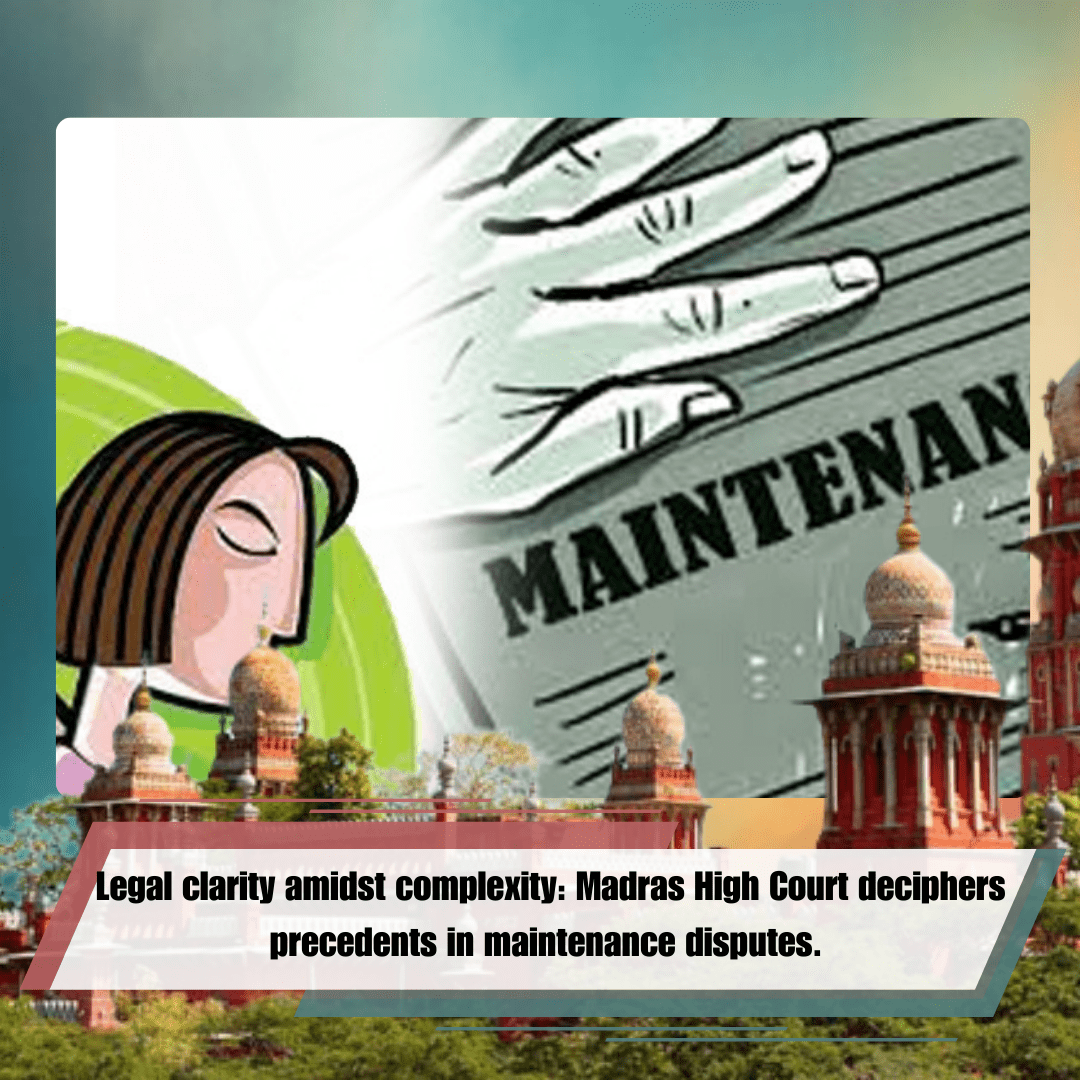Case title: S.Menaka v. K.S.K.Nepolian Socraties
Case no.: C.M.P.No.18729 of 2023 in C.M.A.No.1914 of 2021
Decided on: 21.03.2024
Quorum: Hon’ble Justice M. SUNDAR, Hon’ble Justice K.Govindarajan Thilakavadi
FACTS OF THE CASE:
The case involved the issue of appeal maintainability under Section 19 of the Family Courts Act against a pendente lite maintenance order under Section 24 of the Hindu Marriage Act. Both the husband and wife filed appeals challenging the interim maintenance order. Legal precedents like Arunoday Singh Vs. Lee Anne Elton and Utility Users’ Welfare Association case were referenced during the proceedings. Various counsels presented enlightening submissions on the interpretation and application of relevant laws and precedents.
LEGAL PROVISIONS:
Section 19 of the Family Courts Act: Pertaining to the constitution of Family Courts to deal with disputes relating to marriage and family affairs.
Section 24 of the Hindu Marriage Act: Regarding pendente lite maintenance orders.
Section 28 of the Hindu Marriage Act: Dealing with appeals from decrees and orders under the Act.
Relevant legal precedents: Including Arunoday Singh Vs. Lee Anne Elton and Utility Users’ Welfare Association case, which were referenced for legal reasoning during the proceedings.
APPELLANTS CONTENTION:
The appellants, representing the husband in the case, vehemently argued for the maintainability of the appeal under Section 19 of the Family Courts Act against the pendente lite maintenance order issued under Section 24 of the Hindu Marriage Act. They raised significant concerns regarding the legality and validity of the maintenance order, questioning its basis and the grounds on which it was granted. The appellants highlighted inconsistencies and discrepancies in the application of the relevant legal provisions, emphasizing the need for a thorough review and reconsideration of the interim maintenance order. Furthermore, the appellants pointed out the contradictory positions taken by the parties involved in the proceedings, underscoring the need for clarity and consistency in the interpretation and application of the law. They argued for a comprehensive examination of the facts and legal principles at hand to ensure a fair and just resolution of the dispute. The appellants sought to establish a strong legal foundation for their appeal, emphasizing the importance of upholding the principles of justice and equity in the adjudication of the case.
RESPONDENTS CONTENTION:
The wife in the case, supported the maintainability of the appeal under Section 19 of the Family Courts Act. They emphasized the importance of adhering to the legal procedures and requirements set forth in the relevant statutes, including the Hindu Marriage Act. The respondents highlighted the need for continued compliance with the conditions of the interim maintenance order, stressing the ongoing nature of the obligations outlined in the order. While acknowledging the need for further discussions on the maintainability issue before delving into the substantive arguments of the case, the respondents expressed confidence in the validity of their position. They underscored the significance of upholding the rights and entitlements of the parties involved, particularly in matters concerning maintenance and support. The respondents sought to ensure a fair and just resolution of the dispute, advocating for a thorough and meticulous examination of the legal provisions and factual circumstances at hand to arrive at a reasoned and equitable decision.
COURT’S ANALYSIS AND JUDGMENT:
In the case at hand, the court engaged in a comprehensive analysis of the legal provisions, precedents, and arguments put forth by the parties involved. The central focus of the court’s deliberation was the question of the appeal’s maintainability under Section 19 of the Family Courts Act against the pendente lite maintenance order issued pursuant to Section 24 of the Hindu Marriage Act. This critical examination required a meticulous review of the relevant statutes to ascertain the scope and applicability of the appeal in the context of the maintenance order. Drawing upon established legal precedents such as Arunoday Singh Vs. Lee Anne Elton and Utility Users’ Welfare Association case, the court sought guidance from past decisions addressing similar issues. By referencing these precedents, the court aimed to ensure consistency and coherence in its legal reasoning, thereby reinforcing the principles of judicial interpretation and application of the law. Throughout the proceedings, the court carefully considered the contentions presented by both the appellants and respondents. Key points of contention included the legality and validity of the maintenance order, adherence to legal procedures, and the respective rights of the parties involved. These arguments formed the basis for a robust legal debate, highlighting the complexities inherent in matters of maintenance and support within the framework of matrimonial disputes. Upon thorough analysis and deliberation, the court rendered a judgment on the crucial issue of the appeal’s maintainability. This decision was informed by a nuanced understanding of the legal provisions, precedents, and factual circumstances surrounding the case. By providing a reasoned judgment, the court aimed to uphold the principles of justice and equity, ensuring a fair and just resolution of the dispute at hand. In essence, the court’s meticulous analysis and judgment underscored the importance of a rigorous legal examination in resolving complex legal disputes. By navigating through intricate legal arguments and precedents, the court demonstrated its commitment to upholding the rule of law and delivering justice in a manner that is both principled and equitable.
“PRIME LEGAL is a full-service law firm that has won a National Award and has more than 20 years of experience in an array of sectors and practice areas. Prime legal fall into a category of best law firm, best lawyer, best family lawyer, best divorce lawyer, best divorce law firm, best criminal lawyer, best criminal law firm, best consumer lawyer, best civil lawyer.”
Judgement reviewed by – Ayush Shrivastava
Click here to read the full judgement.


